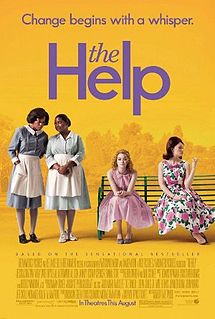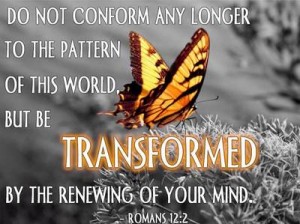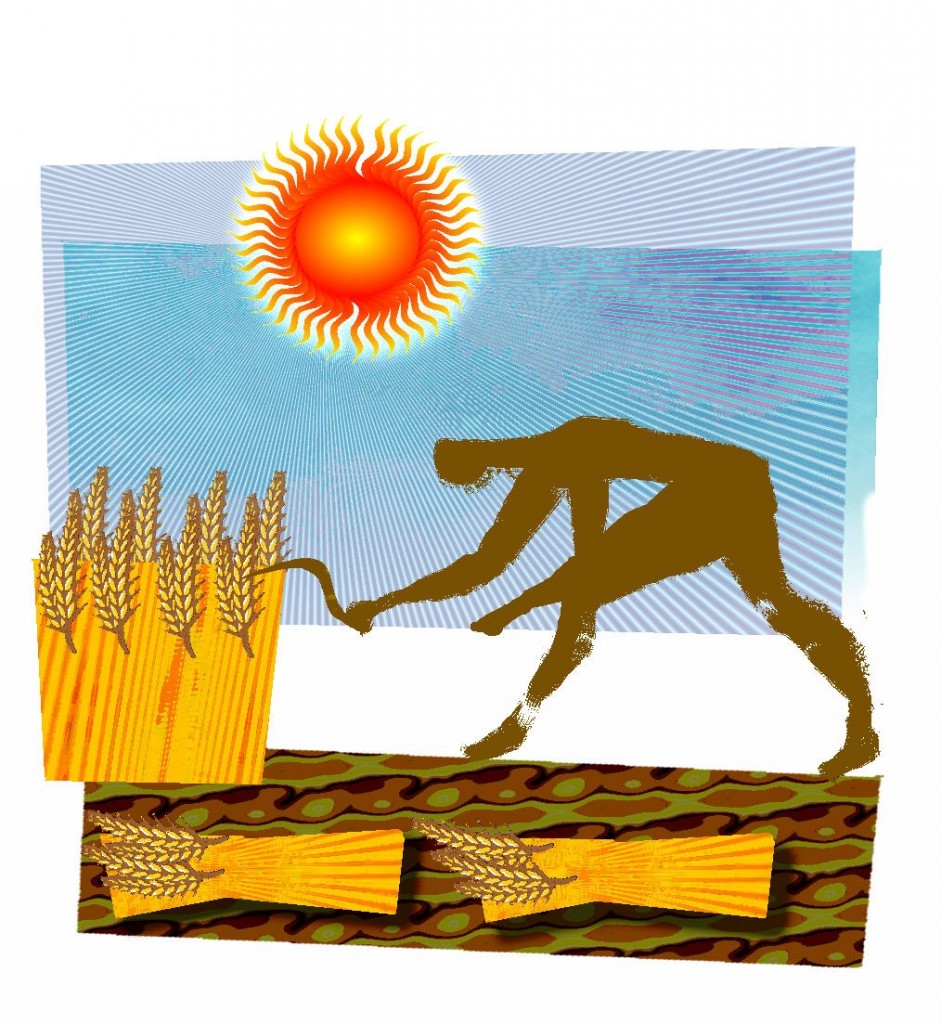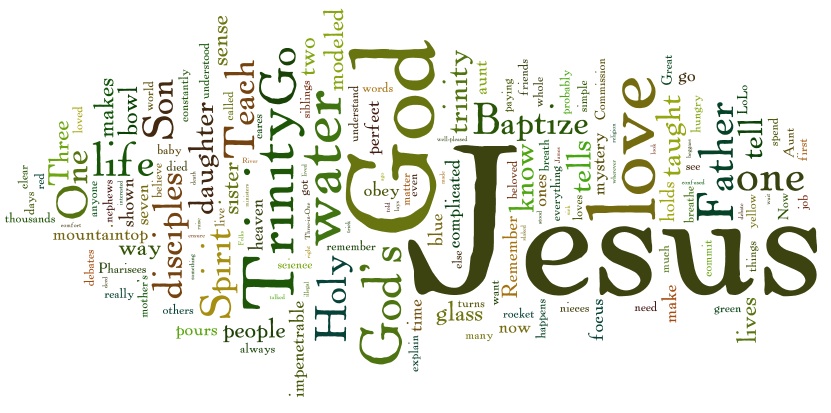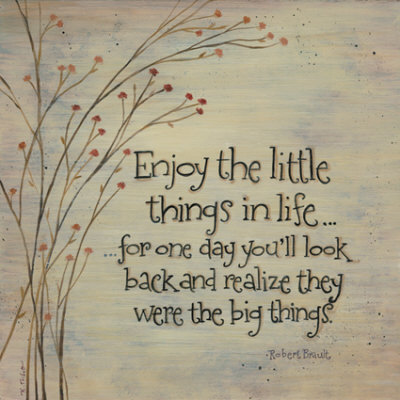Philippians 4:1-9
OK, it is true confession time:
How many of you have something that Steve Jobs created? … How many of you have something that Steve Jobs created? iTunes? An iPod? An iPhone? An iMac? A MacBook? An iPad?
Isn’t it amazing how ubiquitous those little things are?
In 1997, Steve Jobs returned to Apple, the company that he had co-founded with Steve Wozniak, the company that had fired him, and within a few years of his return, our world was a different place.
First he gave us the iPod, that magical little device that carried thousands of our songs.
Two years after that, he gave us iTunes, the fastest, cheapest way and most legal way to buy those songs.
Then he gave us the iMac, the first personal computer that was not steel gray. Then he gave us the iBook. And then the MacBook. And then iPhone. And then MacBook Air. And then the iPad.
In 10 years, one decade, Steve Jobs changed the world.
You know how he did it? He managed to change the world by refusing to settle. He would not settle for seeing things as they were and asking, “Why?” Steve Jobs dreamed of the way things could be and he asked, “Why not?”[1]
“Why not?”
Now whether you are a Mac person or not – and here is my true confession: I am – you have to admit that Steve Jobs, who died last Wednesday, changed the world. He did so because he always, always, was striving for the “Why not?” He was always striving for the pure, for the pleasing, and for the commendable, and whatever he dreamed, he made happen.
In many ways, Steve Jobs emulated what the Apostle Paul charges us with this morning in his love letter to the Philippians:
Finally, beloved, whatever is true, whatever is honorable, whatever is just, whatever is pure, whatever is pleasing, whatever is commendable, if there is any excellence and if there is anything worthy of praise, think about these things.
Now, I know that when we are listening to Paul’s instructions, they can be somewhat Pollyanish, they can seem like they are some over-the-moon optimism that completely, completely divorces us from the reality that is our lives.
Because when we take a good hard look at our lives right now, when we take an honest look at our lives right now, we know that life is not all that great.
To quote Jim Wallis from his God’s Politics blog on Friday:
“Tomorrow, almost 14 million Americans will still be unemployed.
“Tomorrow, the homes of more than 2,500 new U.S. families will enter foreclosure.
“Tomorrow, one in seven U.S. households still will not know where their next meal is coming from.
“Tomorrow, one in four American children under the age of six will still be living below the poverty line.
“Tomorrow, three billion people around the globe will still be living on less than $2.50 a day.
“Tomorrow, 400 million children will still lack access to clean water.
“Tomorrow, 300 children under the age of five will die in the Horn of Africa because of famine.”[2]
When you paint a portrait of the world with those numbers, the situation seems bleak.
And it seems very nearly impossible to find, much less name, that which is true, honorable, just, pure, pleasing, commendable. It seems even more impossible to find any excellence.
Quite frankly, when we use those numbers to paint the portrait of the world, most of us think that the world has already gone to hell in a handbasket. And that there’s not much that we can do about it.
And yet …
And yet … there is Paul, writing to us from prison, from a Roman prison, in chains, facing death and still demanding that we look for that which is true, honorable, just, pure, pleasing, commendable, and excellent.
Paul writes these instructions because Paul knew that all things come of God, and therefore, all things are good. Paul knew that each and every one of us comes from God, and therefore, each and every one of us is a beloved child of God.
Paul was looking at the world with God’s eyes, not with human eyes. He was not trying to advocate the “power of positive thinking.” He was not trying to get us to go with a “technique and persuasion”[3] that was Pollyanish. Instead, what he was doing was trying to show us how to fill ourselves with God so that we could go out into the world and take God’s life with us into that world. He didn’t want us to be a bunch of Pollyanas paying no attention to the truth! He was not trying to get us to turn a blind eye to the needs of the world! Or to make us pretend that there’s really nothing wrong, because “I’ve got mine and I don’t really care if other people got theirs.”
Paul is trying to get us up off our duffs and get us to go out into the world with God’s life in us and share God’s life with the world.[4]
Paul wants us to change the world.
To stop looking at things as they are and crying out, “Why, Lord, why???” and to start dreaming of things as they can be and saying, “Why not?!”
Why not?!
Why not focus on the good things and the holy things, the things that come from God and are blessed by God?
Why not build on God’s holy foundations, so that we can make the world a better place – not the guy up the street, us, so that we can make the world a better place!
Why not make the “why not’s” of our dreams and make them come to fruition?!
This is our moment, my friends.
This is our time …
It is our time to stop the negative comments that pass for conversation in our lives and to start enunciating every good, God-blessed thing that we can find in each other.
It is our time to give grace, even when nobody’s giving grace back!
It is our time to work together for the common good, not for our gain, but for the common good!
This is our time to change the way things are, so that we can make them the way they can be.
Right now, when the world seems to be in such desperate straits, when our public conversation is so nasty that we don’t even want to expose our children to it, when our leaders cannot even go one day – one day, one, measly day – without denigrating people on the other side of the aisle, right now, this is our time, this is our opportunity to change the world.
It is not enough for us to simply say, “Well, this is wrong, and this is bad, and this is awful!”
It is not enough to denounce evil, because “denouncing evil is a far cry from doing good.”[5]
What we have to do is dream of the way things can be and say, “Why not?”
And then go make those things happen!
And we can do this. We can focus on even the tiniest of things, that are true, that are honorable, that are just and pure and pleasing and commendable. If we spent more time looking for what is excellent and worthy of any praise, and less time looking for what we can tear down, we could make the world a better place!
This is our call.
And now is our time.
Now, is anybody here going to be the next Steve Jobs?
Anybody?
I know I’m not.
But that doesn’t mean that I can’t emulate him. That doesn’t mean that I can’t dream the way that Steve Jobs dreamed. That doesn’t mean that I can’t change the world.
We have an opportunity. We have an opportunity to dare to dream … as Paul dreamed … as Jobs dreamed.
And we have the ability to make those dreams come true.
Right now.
Why not?
Amen.
Sermon preached at the Church of the Good Shepherd, Burke, Va., on the 17th Sunday after Pentecost, Proper 23, Year A, 9 October 2011.
[1] Paraphrase of George Bernard Shaw, the Serpent to Eve, in Back To Methuselah.
[2] Jim Wallis, “Praying for peace and looking for Jesus at #Occupy Wall Street,” God’s Politics blog, http://blog.sojo.net/2011/10/06/praying-for-peace-and-looking-for-jesus-at-occupywallstreet/.
[3] paraphrase from William Loader, Murdoch University, Uniting Church in Australia, http://wwwstaff.murdoch.edu.au/~loader/AEpPentecost17.htm
[4] Ibid.
[5] “Denouncing evil is a far cry from doing good.” ~ Philip Gourevitch, author of We Wish To Inform You That Tomorrow We Will Be Killed With Our Families, the story of the Rwandan genocide.





